#'human beings are defined by their flaws'
Explore tagged Tumblr posts
Text
"It's so rare for R to be in her right mind for a spell. Should she really be wasting the precious little lucid time she has writing this?" "Don't worry. For a witch, this is the most important thing."
you mean to be telling me that it's an explicit point that rhinedottir is rarely in the proper state to do spells and write things like this. and of all the choices she had not to. she chooses to write it and places importance (read. it's established as the MOST IMPORTANT THING too.) in spending said-precious-time to write something with her friends commemorating andersdotter. hoyo i need youto stare me in the eyes and real the implications of rhinedottir expending what the other's are describing as her "precious little lucid time" to commemorate and make an ode to her dead friend HOYOPLEAS
#i need everyone who characterizes her as a pure evil being and whatever to shutup so bad rn.DO YOU READ !!!!!!!!!!!!!!!!!!!!!!!!!!!!!!!!!!!!#that was mean. i dont mean that.#more so:#LOOK AT HOW SHE'S BEING BUILT AS COMPLEX#she's done horrible things but. so have so many other people?? and i never see THEM characterized as only their sins#albedos one line#'human beings are defined by their flaws'#(or something to that affect)#has NEVER been more true#youguys did you take a 6th grade english class. You can be honest#how are you gonna look at this woman whose been explicitly built with nuance#as a person both sinful and good. but defined almost explictly by said sins purely for the fact she's human and against what's 'good'#AND THEN GO AND SAY SHE'S ONLY EVIL????????????????#ARE WE PLAYING THE SAME GAME/?????????????????#look at the distinction between the hexenteaser and alice's impression. read the blossoming starlight description.#try reading albedo's character stories with the slightest hint of media comprehension#THE ENTIRE POINTOF HER CHARACTER IS. SIMPLIFIED AND SHOWED THROUGH ALBEDOS STUPID LINE ABOUT HUMANS#PLEASE!!!!!!!!!!!!!!!!!!!!!!!!1#anyways ifyou want to see some of the msot accurate interpretations of her i've ever seen pls go read reverie or nutmeg's fics💜💜#ok im done with all of that. thanks for coming to my ted talk#crepe rants#rhine#rhinedottir#genshin leaks
43 notes
·
View notes
Text
beard: Ted is my best friend, he is my savior, he is my rock. I will define my life by servicing him as his assistant and I will drop my entire life in the span of three days just because he asked me to. My biggest regret that still haunts me years and years later is that I betrayed him, and I have been punishing myself ever since. He’s an agent of good, I follow him like he is Jesus and I am just a simple worshiper. I love Ted. I have ruined relationships because of my devotion to Ted, my own girlfriend turned wife hates Ted with a passion due to her jealousy. I am constantly having to pick between my girlfriend and ted.
ted: this is my best buddy beardo :{D
#beard’s arc being so defined by ted and how ted has changed him but like#ted just. is vibing.#the writers didn’t give them a lot of emotional connection on Ted’s side so it really feels so funny#like ted expressed worry for beard lile. three times. and he didn’t help him with really anything#not like he has with other characters#and beard is so defined by ted and helping ted#like the advice / help ted has given is all pre canon#and used by beard as a reference within the show#like when beard reminded ted how he helped him on his first day or advice after that bad breakup#the entire prison / ted helping him story was only brought up by beard to someone else#and like beard’s devotion is definitely codependent and it’s not necessarily the most healthy thing in the world lmao#he has a lot of issues !!! but he really truly does love ted#and he doesn’t see him as an infallible guy despite seeing him as an agent of good#like he knows ted is HUMAN. he’s a man. just a man. he knows that#he doesn’t think he’s this holy flawless person. he loves him with his flaws#and his humanness
17 notes
·
View notes
Text
Where Did You Learn?
(Davrin, Bellara, and Neve & Vincent Thorne)
Vincent Thorne knows that there's no better way to spend a day than by painting. It just so happens that the ceiling of the Lighthouse is the best canvas to help illustrate the events of a city elf's life.
#original content#vincent thorne#dragon age#dragon age the veilguard#ao3#da davrin#bellara lutare#neve gallus#da rook#I love city elves so much#so so much#I love Vinny's character so much#the more developed I make him the more I love him#Veilguard not letting your character really be dalish-dalish but also... not talking about SHIT relating to city elves makes my blood boil#I LOVE THE ELVES SO MUCH BUT I DON'T *CARE* ABOUT THE ANCIENTS#Give me Dalish give me city elves#give me THE MODERN PEOPLE#THE ONES TRYING TO MAKE A LIFE AS A DIASPORA#It's so much more compelling to me than just “oooooh but the Ancient gods / not gods / we'll call them gods anyway”#“who gives a fuck about the series' previous games constantly deconstructing godhood and exploring what makes faith Faith”#Vinny is such a good man and has such Real flaws I feel#He's a city elf and does NOT give a fuck about being “elfy”#at least not in the way the Dalish define it#he just wants his family to survive living in a society dominated by humans#and I think that's neat
5 notes
·
View notes
Text
people are of course free to feel how they want about things regarding isat and what parts of the story/characters/gameplay etc they like and dislike.. Hell i sure have things i dislike along with all my love for the game. but i feel like a lot of the grievances i've seen about the artbook are just taking something that's clearly a joke too seriously, in an extra content book that's just meant to show some behind the scenes and creators thoughts. Like komaeda's in this book ok lets chill out
#i dont think 'i forgive you kitten' is the hill to die on about mental health. Actually can i say skmething. Can i say something#I think it's fine and even interesting for the party to have views on siffrin post-loops that honestly aren't helpful or healthy#or what siffrin needs (And vice versa from siffrin's side too.!) of course they all love and care for eachother#in such a deep way that they are inseperable no matter their actual physical distance. but. theyre human and thats why isat's chara writing#is so beloved .. so its fine to explore the possibility of their skewed views of siffrin. Like in their view they woke up#On the day of the end of the world. And the silly funny kind of mysterious fella in their party is suddenly going crazy and also omniscient#And then they find out through a third party(yeowch) a General Jist of what's been going on#so at JUST the end of the game yes i think their view of the situation is going to be far removed from what actually happened#Until siffrin opens up about the severity of it. Or lack of if you're the guy who soeedrsn the game in 14 loops#Also its quite heavily wstablished that genuine empathy and emotional connection does NOT come easily to odile#and she's slightly condescending multiple times (character flaw otherwise(charm point. to me))#so really that seemsnlike a frustratingly Odile way to conceptualize it to me LMFAO#is it realistically a good way to view your dear family who just had a severe psychotic break because of the torture nexus NO.#but does that make it interesting from a character standpoint Well yes.#This kind of got away from me. I like odile :)#by 'things i dislike' in this post i mean that some of the dialogue grates on me heavily. Yes its the thmblr game and i respect that#Does not mean i have all of the tumblresque dialogue that often made me roll my eyes. However#it is forgiven in the way that some of it comes back around by changing with the loops and turning into something genuine#and character defining. best example is the nya bit. First time j was like uuuuhg fucking ok we get it he's a catboy made in the blorbo lab#And then it comes around as them getting jnsanely frustrated with the loops themselves the repetition their disability#which is a cinstant reminder to every reset going back to a strained relationship with bonnie. the loop where he hits the counter#And just sits to shut down in silence made me go Ok i forgive the nya bit. And then when they break the counter of course we all love it.#ACTUALLY that bit is a very Odile character moment too. When she genujnely offers for someone else to lead#But because of odiles past being slightly condescending(even as jokes) + siffrins own martyr complex he takes it as being seen as incapable#Sorry i love the messy intricacies i hope nobody fucking reads all this
6 notes
·
View notes
Text
yall. yall know that psychiatry isnt real right. like. you shouldnt exclude someone from a community just because they dont align with what an incredibly ableist and cruel system says. you. you all know this right. I'd expect you, community full of mentally ill and disabled people who have been fucked over by psychiatry over and over and over, to know this by now
#i speak 2#sighs. when will we learn that people arent made to be defined and its an actual flaw in human beings to try and create Categories#like. a diagnosis for asd for example. thats. thats a collection of traits that are big enough to put that person into The Asd Group#and a diagnosis for a pd would be. this person has a collection of traits that are big enough to put this person into The [x]pd Group#the way we conceptualize disprders is so inherently flawed and inhuman that it gets very very obvious how incredibly ableist it is when#you think about the mentally ill/disabled as Real Life Complicated People instead of characatures.#i mean. i assume the train of thought was#“this individual must have a disease that separates you from everyone else because they have the traits xyz”#or something like that. and. is that not obviously ableist#what do we gain by upholding this human structure. its like gender roles to me#except i have never once seen a post with more than maybe 100 notes mention it#and thats just on tumblr the Wokest Website Ever That Hates Trans People#i dont even want to know what the fuck the consensus is on other platforms#idk. can anyone hear me#am i literally the only one here that sees this shit. have none of you even thought about it#and. you know what#yeah im maintagging this shit#actually mentally fucked#mental illness#pd safe#actually plural#pdblr#HAH NOW YOU FUCKERS HAVE TO LISTEN TO ME. GET INTROSPECTIVE'D#GET WOKE'D
2 notes
·
View notes
Text
The Villain Checklist!
Creating a villain is a delicate art, much like crafting a masterpiece. To ensure your antagonist leaps off the page with depth, consider these essential elements for your villain checklist:
Motivation: Every great villain is driven by a potent motivation, one that fuels their actions and sets them on their dark path. Explore their backstory and unearth the core reason behind their villainy. Are they seeking power, revenge, redemption, or something more sinister?
Complexity: Gone are the days of one-dimensional villains twirling mustaches and cackling maniacally. Infuse your antagonist with layers of complexity and nuance. Perhaps they possess redeeming qualities or wrestle with inner conflicts that humanize their actions.
Flaws and Vulnerabilities: Despite their nefarious intentions, villains should be flawed beings with vulnerabilities. These weaknesses not only add depth to their character but also create opportunities for conflict and growth throughout your story.
Backstory: Delve into your villain's past to uncover formative experiences that shaped their present disposition. Trauma, betrayal, or societal pressures can all contribute to their descent into villainy, providing rich narrative fodder for exploration.
Goals and Ambitions: Just as heroes strive for noble objectives, villains pursue their own twisted goals with fervor and determination. Define what your antagonist hopes to achieve and the lengths they're willing to go to attain it, even if it means sacrificing everything in their path.
Antagonistic Traits: From cunning intellect to ruthless brutality, equip your villain with traits that make them a formidable adversary for your protagonist. Consider how their strengths and weaknesses complement each other, creating dynamic conflicts that propel your story forward.
Relationships and Alliances: Villains don't operate in isolation; they forge alliances, manipulate allies, and cultivate relationships to further their agendas. Develop the connections your antagonist shares with other characters, be they loyal minions or reluctant collaborators, to add depth to their character dynamics.
Moral Justification (from their perspective): While their actions may be abhorrent to society, villains often believe they're justified in their pursuits. Explore your antagonist's moral code and the twisted logic that rationalizes their behavior, offering readers insight into their twisted worldview.
Arc of Transformation: Just as protagonists undergo arcs of growth and change, villains should experience their own journey of transformation. Whether it's redemption, downfall, or something altogether unexpected, chart the evolution of your antagonist throughout the narrative.
Memorable Traits: Give your villain distinctive traits or quirks that leave a lasting impression on readers. Whether it's a chilling catchphrase, a distinctive appearance, or a haunting backstory, give your antagonist elements that linger in the minds of your audience long after they've closed the book.
#writing#writer on tumblr#writerscommunity#writing tips#character development#writing help#write villain#writing villains#my ocs#creative writing#oc character#writing block
5K notes
·
View notes
Text
It's always been intriguing to me that, even when Elizabeth hates Darcy and thinks he's genuinely a monstrous, predatory human being, she does not ever perceive him as sexually predatory. In fact, literally no one in the novel suggests or believes he is sexually dangerous at any point. There's not the slightest hint of that as a factor in the rumors surrounding him, even though eighteenth-century fiction writers very often linked masculine villainy to a possibility of sexual predation in the subtext or just text*. Austen herself does this over and over when it comes to the true villains of her novels.
Even as a supposed villain, though, Darcy is broadly understood to be predatory and callous towards men who are weaker than him in status, power, and personality—with no real hint of sexual threat about it at all (certainly none towards women). Darcy's "villainy" is overwhelmingly about abusing his socioeconomic power over other men, like Wickham and Bingley. This can have secondhand effects on women's lives, but as collateral damage. Nobody thinks he's targeting women.
In addition, Elizabeth's interpretations of Darcy in the first half of the book tend to involve associating him with relatively prestigious women by contrast to the men in his life (he's seen as extremely dissimilar from his male friends and, as a villain, from his father). So Elizabeth understands Darcy-as-villain not in terms of the popular, often very sexualized images of masculine villainy at the time, but in terms of rich women she personally despises like Caroline Bingley and Lady Catherine de Bourgh (and even Georgiana Darcy; Elizabeth assumes a lot about Georgiana in service of her hatred of Darcy before ever meeting her).
The only people in Elizabeth's own community who side with Darcy at this time are, interestingly, both women, and likely the highest-status unmarried women in her community: Charlotte Lucas and Jane Bennet. Both have some temperamental affinities with Darcy, and while it's not clear if he recognizes this, he quietly approves of them without even knowing they've been sticking up for him behind the scenes.
This concept of Darcy-as-villain is not just Elizabeth's, either. Darcy is never seen by anyone as a sexual threat no matter how "bad" he's supposed to be. No one is concerned about any danger he might pose to their daughters or sisters. Kitty is afraid of him, but because she's easily intimidated rather than any sense of actual peril. Even another man, Mr Bennet, seems genuinely surprised to discover late in the novel that Darcy experiences attraction to anything other than his own ego.
I was thinking about this because of how often the concept of Darcy as an anti-hero before Elizabeth "fixes him" seems caught up in a hypermasculine, sexually dangerous, bad boy image of him that even people who actively hate him in the novel never subscribe to or remotely imply. Wickham doesn't suggest anything of the kind, Elizabeth doesn't, the various gossips of Meryton don't, Mr Bennet and the Gardiners don't, nobody does. If anything, he's perceived as cold and sexless.
Wickham in particular defines Darcy's villainy in opposition to the patriarchal ideal his father represented. Wickham's version of their history works to link Darcy to Lady Anne, Lady Catherine (primarily), and Georgiana rather than any kind of masculine sexuality. This version of Darcy is a villain who colludes with unsympathetic high-status women to harm men of less power than themselves, but villain!Darcy poses no direct threat to women of any kind.
It's always seemed to me that there's a very strong tendency among fans and academics to frame Darcy as this ultra-gendered figure with some kind of sexual menace going on, textually or subtextually. He's so often understood entirely in terms of masculinity and sexual desire, with his flaws closely tied to both (whether those flaws are his real ones, exaggerated, or entirely manufactured). Yet that doesn't seem to be his vibe to other characters in the story. There's a level at which he does not register to other characters as highly masculine in his affiliations, highly sexual, or in general as at all unsafe** to be around, even when they think he's a monster. And I kind of feel like this makes the revelations of his actual decency all along and his full-on heroism later easier to accept in the end.
------------
*The incompetently awful villain(?) in Sanditon, for instance, imagines himself another Lovelace (a reference to the famous rapist-villain of Samuel Richardson's Clarissa). Evelina's sheltered education and lack of protectors makes her vulnerable to sexual exploitation in Frances Burney's Evelina, though she ultimately manages to avoid it. There's frequently an element of sexual predation in Gothic novels even of very different kinds (e.g. Ann Radcliffe's The Mysteries of Udolpho and Matthew Lewis's The Monk both lean into this, in their wildly dissimilar styles). William Godwin's novel Caleb Williams, a book mostly about the destructive evils of class hierarchies and landowning classes specifically, depicts the mutual obsession of the genteel villain Falkland and working class hero Caleb in notoriously homoerotic terms (Godwin himself added a preface in 1832 saying, "Falkland was my Bluebeard, who had perpetrated atrocious crimes ... Caleb Williams was the wife"). This list could go on for a very long time.
**Darcy is also not usually perceived by other characters as a particularly sexual, highly masculine person in a safe way, either, even once his true character is known. Elizabeth emphasizes the resilience of Darcy's love for her more than the passionate intensity they both evidently feel; in the later book, she does sometimes makes assumptions about his true feelings or intentions based on his gender, but these assumptions are pretty much invariably shown to be wrong. In general the cast is completely oblivious to the attraction he does feel; even Charlotte, who wonders about something in that quarter, ends up doubting her own suspicions and wonders if he's just very absent-minded.
The novel emphasizes that he is physically attractive, but it goes to pains to distinguish this from Wickham's sex appeal or the charisma of a Bingley or Fitzwilliam. Mr Bennet (as mentioned above) seems to have assumed Darcy is functionally asexual, insofar as he has a concept of that. Most of the fandom-beloved moments in which Darcy is framed as highly sexual, or where he himself is sexualized for the audience, are very significantly changed in adaptation or just invented altogether for the adaptations they appear in. Darcy watching Elizabeth after his bath in the 1995 is invented for that version, him snapping at Elizabeth in their debates out of UST is a persistent change from his smiling banter with her in the book, the fencing to purge his feelings is invented, the pond swim/wet shirt is invented. In the 2005 P&P, the instant reaction to Elizabeth is invented, the hand flex of repressed passion is invented, the Netherfield Ball dance as anything but an exercise in mutual frustration is invented, the near-kiss after the proposal in invented, etc. And in those as well, he's never presented as sexually predatory, not even as a "villain."
#self-indulgently long tangents even for me but i had Thoughts!#i almost appended a third footnote to the second footnote. rip#anghraine babbles#long post#fitzwilliam darcy#lady anne blogging#austen blogging#austen fanwank#ivory tower blogging#anghraine's meta#eighteenth century blogging#gender blogging#i do think it's interesting that associating his flaws with lady catherine's is honestly fair - she comes to wonder about this later#but lbr that is totally understandable! lady catherine is the awful parody version of him!#but the times when elizabeth's assumptions are highly inflected by Yes All Men Actually generalizations she's utterly wrong#it's not some horrible misdeed but it's not really fair#not because she's oppressing him (lmao) but because people don't work that way#not saying that p&p is some huge blow against gender essentialism but i do think it's FAR less friendly to it than its fans are
1K notes
·
View notes
Text
⋆𐙚₊ 𝓽𝐡𝐞 𝔀𝐞𝐢𝐫𝐝 𝓴𝐢𝐝 ˚⊹♡



admirer!sunghoon x oblivious!female reader content(s): sunghoon yearns, obsessive mannerisms, manipulation, reader likes cats/dogs, both implied to be in college/university — the weird kid's become fixated with you, and he wants you for himself
sunghoon isn’t a weird kid—well, not in people’s eyes. but he himself thinks he is. because for some reason, he can’t seem to blend in with any crowd, neither can he maintain a private conversation with anyone over 5 minutes. he doesn’t understand their jokes, or their slang, or their mannerisms. sometimes, he believes he’s from an entirely different ecosystem than them.
was he an impostor—an alien that got left on earth by mistake? at this point, he thinks it’s plausible.
it’s not that he’s shunned or anything. in fact, it’s the opposite. with striking features that are practically ethereal and a figure so lean and defined that rivals sculptures, he turns heads wherever he goes. but he can’t seem to reciprocate the attention.
and despite never being alone, he feels alone.
like a puzzle piece that fits too tight or too loosely—filling the space but never quite fitting in.
until, you came.
you weren’t outstandingly eye catching, nor were you completely inconspicuous but sunghoon’s gaze caught you either way.
crouching in an alley near his apartment, cooing as you fed the stray cats in a manner one would think you’re feeding human children. your socks mismatched in your cartoon slippers and fingerless knitted gloves doing nothing to warm your frozen fingers.
he isn’t sure what exactly about you caught his eye. maybe it’s the unfamiliarity in his otherwise typical routine, or the way you had your back turned so carelessly, or the way your eyes sparkled with genuine affection and attention for the cats who you clearly can’t socialize with.
there’s an obvious language barrier between you and the felines and yet, you speak to them, dote on them like you truly understand them—a species so entirely different from you.
and for the first time ever, he thinks someone else is weird.
the next few times he saw you, it was always at the same times. he would see you on his way back to his place, he’d pause to watch with hands in his pockets and cheeks flushed from the cold and leave the moment you stand.
even when it rained, when he’d expect you to be cooped up at home in comforting warmth and security, he found you in the alley with an umbrella over the cats rather than yourself as you fed them. and you’d hold it for as long as they needed to finish their meal.
and for the first time ever, his brows knitted as a thought crossed his mind.
‘how dumb…’ a pause. ‘and weird.’
it was the first time he had found someone foolish. he’d fail to understand people’s lingo sometimes but he’d always thought it was a flaw in his part—never theirs. until you came.
despite how dumb and odd sunghoon thought you were however, he couldn’t help but keep coming to watch like an avid fan. in fact, he's found himself a new guilty pleasure in learning your schedules—how elated he was when he found out you live in the same building as him. and even more so when you're just above his floor. and this kept going and going until the snow melted and flowers bloomed.
he’s ditched the coats and gloves to something lighter now and with a plastic bag of snacks in hand, he makes his way to watch his favorite artist: you.
he expects you’d be wearing an array of colours—a habit he's found you do because you can't be bothered to plan your outfits everyday—and crouching again, sacrificing your poor knees as you feed your furry friends with your back turned towards him and—
oh.
he’s stiffened entirely in place just as he’s about to crash into you who swerved out the alleyway with your head low.
you gasp as you jump backwards slightly and he furrows subtly.
you’ve strayed from routine. weird.
“sorry, i should’ve looked where i was going,” you apologize timidly and the sound of your normal voice—different from your doting cooing—sends shivers down his spine and his ears ring.
in a good way. because now your voice is echoing inside his head as if bouncing off the walls of a hollow cave.
sunghoon forgets to answer initially. “it’s fi—”
now it’s his words that freeze at the sight of your face. no, it’s not because your beauty steals his breath away or because you look different from how he expects—none of that. after all, he’s seen you time and time before.
instead, it’s because you’re…crying.
there are pools of blue in your typically scintillating eyes, shimmering cold lines on your usually warm, glowing cheeks and a downward curve on the corners of your lips that are always, always lifted.
once again, how odd.
“yes?” you pull him from his thoughts and only then does he notice the croak in your otherwise velvety tone.
his jaw clenches and eyes sharpen.
this is weird. you’re weird. and he doesn’t like this. he doesn’t like how he’s affected by this—by you.
he’s supposed to walk away, turn a blind eye to things that don’t concern him. you’re not one of his acquaintances, there’s no need to pretend to care and ask you what’s wrong and offer his shoulder.
he can walk away. he should walk away.
“what’s wrong?”
but he doesn’t.
there’s a flicker of surprise in your eyes before you look away with a weak chuckle.
“nothing, just, the cats i usually feed aren’t here. apparently they’ve been taken by animal control because someone reported them as ‘neighborhood pests’.”
sunghoon listens intently as you speak.
your raw voice is beautiful.
you turn to him—a smile, bittersweet, on your face. “i just got a bit sad that i won’t be seeing them anymore.”
your smile is simply sweet.
he blinks a few times, processing your words after brushing away his ‘intrusive’ thoughts. “they were strays, weren’t they?”
your brows knit for just a second.
he notices.
“this place was their home. they’ve lived in this neighborhood far longer than some residents have,” you declare. he senses a hint of defiance.
he takes a mental step back. there’s no use arguing.
“you’re right,” he agrees. “i was insensitive. i’m sorry.”
your shoulders visibly loosen and stare softens. “no, i—i get it. they were strays if you think about in another way. i just…felt it was a bit unfair to just take them away from the place they’ve been living at for so long.”
sunghoon tilts his head, curious at the way your mind works. he wants to know more. he yearns to know you. his fingers curl around the handle of his plastic bag tighter. it crinkles. you notice. he sees.
“i just bought some snacks but i think they’d taste better with company—if you don’t mind. as an apology,” he offers. “we can sit at the chairs outside the convenience store.”
your eyes widen slightly and brows raise. he’s going above and beyond just to make up for offending your beliefs. he seems…sweet. he looks sweet. kind and respectful.
feeling slightly uplifted, you nod with a smile. your oh, so honeyed smile. “sure.”
and sunghoon can’t restrain the grin that forms on his typically nonchalant face. “i’m glad.”
the two of you walk side by side and he peeks down at you stealthily. you’re weird and so is he. you’re foolish but even more, he. but you don’t need to know that.
it’d be foolish to confess that he was the one that called animal control just so you’d finally look at him more than you do at your feline friends. he didn’t expect them to be so quick, though.
it was abrupt—his decision—spontaneous and atypical of him.
but weirdly enough, you fell for it.
he’s feeling less lonely now that you’re with him. and it’s weird—but he likes it.

ᡣ𐭩ྀི₊ ⊹ masterlist ᝰ.ᐟ✮⋆˙
copyright © 2024 thinemoonshine all rights reserved
#𖥔ཐི⋆𝓵𝓸𝓿𝓮𝖘𝖎𝖈𝓴𝖓𝖊𝖘𝖘⋆ཋྀ ˚₊‧⁺#༘˚⋆☁️‘en’reverie。⋆𖦹#sunghoon x reader#sunghoon oneshot#sunghoon imagines#possessive sunghoon#enhypen x reader#enhypen fantiction#park sunghoon x reader#sunghoon fanfiction#sunghoon drabbles
361 notes
·
View notes
Text
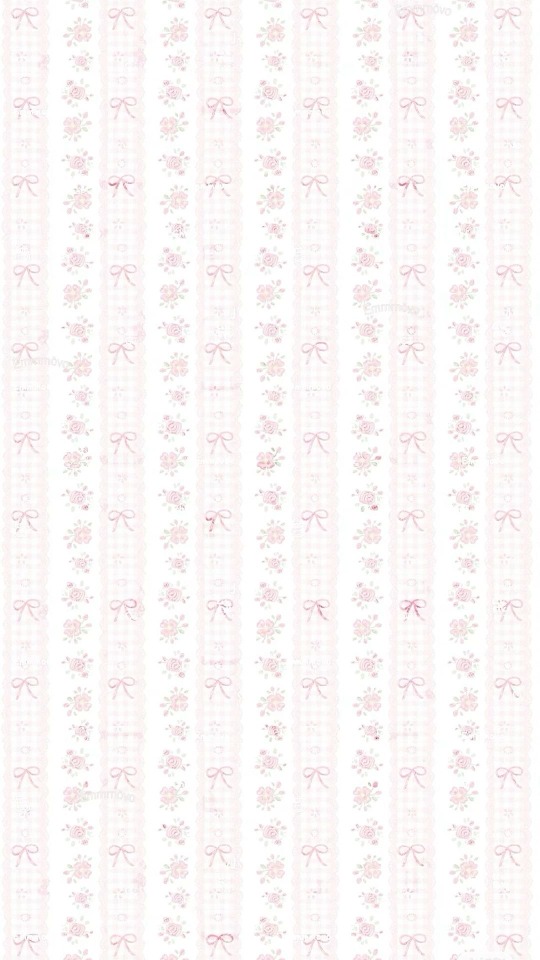
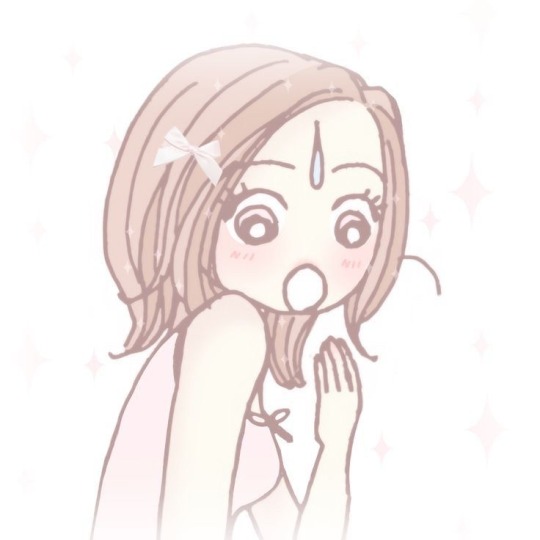

⋆˚✿˖°failure..? doubt...? limitations...? uhh...what is that?
#nonegativityinmyvocabularycuzimgodduh

♡︎doubts
there are moments when doubt clouds your mind, when you question your true nature, and wonder if it’s really possible that you are the embodiment of pure consciousness, that you are god itself. but here’s the truth: you are powerful beyond measure, and doubt is simply the ego’s way of keeping you small. remember, you are not the voice in your head. you are the one who hears it. you are not your body, your circumstances, or the labels others give you. all of those things change. you, however, are the unchanging, eternal awareness behind it all—pure consciousness. that alone is your essence, and it is limitless. it is god in its most divine, infinite form. you are that. your are god.
so why doubt? doubt arises when we identify too strongly with our limited selves—with the ego, the stories we tell ourselves about who we think we are, and the false separation we feel from the universe. but here’s the thing: that separation is an illusion. you are not separate. you are one with everything, one with all beings, one with the source of all creation. if god is infinite and formless, then that is who you truly are.
the world we live in is built on beliefs that reinforce separation and limitation, which make us forget our true nature as god, as pure consciousness.
from a young age, we’re taught to define ourselves by external things—our name, our achievements, our social status, how others perceive us. we’re told that we’re just humans, separate from everything else, living in a material world where everything seems to exist outside of us. society measures success by how much we have or how well we fit into its standards. this constant focus on the external world leads us to forget the infinite power we hold inside.
there’s also a deep-rooted belief in scarcity and competition. we’re told that there’s not enough for everyone and that we need to work hard to “earn” our place in the world. this idea of having to compete with others to survive keeps us in a mindset of lack and limitation. it makes us feel like we’re small, powerless, and unworthy of the greatness we naturally possess.
on top of that, most of us are bombarded by information and distractions that keep our attention outside of ourselves—social media, advertisements, entertainment. these things make us constantly compare ourselves to others, reinforcing the idea that we’re not good enough, that we’re missing something. when our minds are always focused outward, we forget to look within, where our true power lies.
religion, too, can play a role in reinforcing the separation. many traditional religious teachings portray god as something outside of us—an all-powerful being up in the sky, separate from us, judging us. this can make it hard to recognize that god is within us, that we are one with the divine. instead of seeing ourselves as divine beings with infinite power, we’re taught to see ourselves as flawed, imperfect, and in need of salvation from something outside of us.
the education system also teaches us to prioritize logic, reason, and empirical evidence. while these things are valuable, they often make us dismiss our inner knowing, our intuition, and our connection to something greater than the physical world. we start to believe that the only “real” things are those we can see, measure, and prove scientifically, which distances us from the understanding that we are consciousness itself.
all these systems—society, media, religion, education—focus on the material, the external, and reinforce the idea that we’re separate, small, and limited. but these are just illusions. the truth is, beyond all these distractions, we are god in human form. we are the creators of our reality, infinite and powerful beyond measure.
to overcome this conditioning, we need to remember to turn inward, to connect with our true essence. by shifting our focus from the external world to the inner, we can begin to see that the separation and limitation we’ve been taught are illusions. we are, and have always been, one with the infinite.
think about that for a moment: you are the consciousness that creates worlds.
the doubt you feel is just the mind holding on to a false story. it’s the ego trying to convince you that you need to stay small, stay afraid. but you don’t have to. you have the power to step into your true nature at any time, to realize that you are already the infinite, and that nothing can diminish your divine power. cuz ur god duh. 😝
how do you release these doubts?
shift your perspective: any time you find yourself doubting, pause and ask, “who is doubting right now?” is it your higher self, your infinite consciousness? or is it your mind, your ego, your conditioning? you’ll realize that it’s always the latter. remind yourself that the real you, the one observing, is always free from doubt.
affirm your power: wake up every morning and affirm: “i am infinite. i am consciousness itself. i am god in form.” these words are not just affirmations—they are the deepest truth of your existence. repeat them, let them sink into your being, until you feel the energy of your divinity pulsing through your every cell.
remember your unity with everything: god is not something separate from you. the universe is not some distant force. it is you. you are made from the same divine consciousness that runs through every star, every planet, every being. the same consciousness that creates life flows through you, too. you are the universe experiencing itself.
embrace your power: you are not weak, you are not small. you are the creator of your reality, the manifestor of your dreams, and the master of your destiny. nothing outside of you can take that power away from you because it is in you. it is you. every time you doubt, remind yourself of this: i am the creator. i am the source of all power.
you are limitless. the doubt you feel is just a temporary veil over your true power, but it can’t last. every time you bring your awareness back to the present moment, every time you remember that you are pure consciousness, the veil lifts. the illusion fades.
there is no need to doubt when you realize you are already everything you seek. you don’t have to strive to become god, to become powerful, to become divine—you already are. it’s always been you. it will always be you.
so, the next time doubt creeps in, breathe deeply, smile, and remember: you are pure consciousness, infinite, powerful, and divine. you are the creator of all that is. step into that truth and watch the world transform around you.

♡︎failure
we’ve all grown up with the idea that failure is something to be feared, that it’s a sign we’re not good enough or capable enough. but what if i told you that failure isn’t real? it’s an illusion we’ve been conditioned to believe in, and once you truly understand this, especially in the context of the void state, you can release the fear of failure and step into your infinite power.
here’s why failure doesn’t exist and how realizing this can change your entire perspective on life.
1. failure is just a label, not a reality
first of all, the concept of failure is something we create in our minds. it’s a label we slap on situations when things don’t go according to our expectations. society conditions us to believe that if we don’t achieve a specific outcome, we’ve failed. but who decides what failure even means? it’s not the universe. it’s not some law of existence. it’s us, based on societal norms and conditioning.
society sets all these expectations—like getting a certain job, reaching milestones by certain ages, succeeding in school, relationships, and more. when we don’t meet those arbitrary standards, we call it failure. but the truth is, life doesn’t operate according to those rigid standards. there are no universal rules that say you have to achieve a particular thing by a certain time. when we attach the label of failure to an experience, it’s just a reflection of our own beliefs—not reality.
2. the void state: where failure dissolves
now, let’s talk about the void state. the void is a place where all external ideas and constructs—including failure—dissolve. the void state is the place of infinite potential, pure consciousness, and limitless creation. when you enter the void, you step outside of the physical world’s limitations, stepping into a space where everything is possible.
in the void, there is no concept of failure, because there are no external judgments or expectations. it’s a state where you can create whatever reality you desire, free from the constraints of your current circumstances. when you realize you can access this space, the idea of failure becomes irrelevant. why? because the void is a reminder that you are always in control of your reality, no matter what happens in the physical world. failure is tied to the ego’s attachment to outcomes, but in the void, the ego doesn’t exist. the void reminds you that you are not limited by past mistakes, external circumstances, or societal expectations. you are infinite consciousness with the power to create and manifest anything you choose. when you realize this, “failure” can’t touch you, because you understand that you can always start fresh, that you’re constantly creating in each moment.
3. there are only lessons and growth
instead of seeing failure, recognize that every experience is an opportunity for growth. when things don’t go the way you planned, it doesn’t mean you failed—it means you learned. it means you grew. each experience teaches you something valuable about yourself, your path, and the world around you.
when you shift your perspective to see every situation as a stepping stone, you’ll realize there’s no such thing as failure—there’s only progress. every setback is a redirection, a guide leading you toward a better understanding of yourself and your desires. it’s the universe saying, “this is what you need to learn before you reach the next level.” from this perspective, what we call “failure” becomes just another part of the journey toward expansion and self-mastery.
4. the power of the void to manifest success
when you fully embrace the void state and recognize your power to manifest, you understand that there is no wrong path. whatever you desire, you can create it. the void is a space where you can strip away all the beliefs that tell you otherwise, a space where you can manifest new realities instantly, regardless of what has happened before.
if you ever feel like you’ve failed at something, use that as a cue to tap into the void. enter that space of stillness, of limitless possibility, and remind yourself that you are the creator of your life. nothing is set in stone, nothing is permanent. everything is subject to change based on your thoughts and beliefs. if you desire a new outcome, you have the power to manifest it.
in the void, you realize that “failure” is just another momentary experience, not a permanent mark on your life. you can always rewrite the story, start fresh, and bring your desires into reality without being held back by what others call failure.
5. you’re always winning, even when it doesn’t seem like it
when you’re stuck in the mindset of failure, you’re looking through a narrow lens, focusing only on what didn’t go according to plan. but when you zoom out, you’ll often realize that those moments were setting you up for something greater. Trust that you are always winning. every step you take, even when it doesn’t look like success on the outside, is moving you closer to your ultimate goal. sometimes things fall apart so something better can come together. in the void, you can see this clearly, because it’s the place where your higher self is always in control, always guiding you toward your best possible life.
6. failure is just part of the illusion of separation
at its core, the idea of failure is rooted in the illusion of separation—that we are separate from our goals, separate from success, separate from the divine. but in truth, there is no separation. we are already one with everything we desire. the belief in failure comes from the false notion that we’re lacking something, that we’re not enough or that we’re disconnected from our power.
but the void state reminds us that we are already whole, already complete. we are god, we are pure consciousness, and we are the creators of our reality. failure doesn’t exist in a world where you understand that everything is connected, that you are already everything you seek.
embrace your power
the next time you feel like you’ve failed, remember this: failure doesn’t exist. it’s a label we’ve been taught to fear, but it’s not real. in the grand scheme of your infinite existence, there are only experiences—some of them are stepping stones to success, and some are lessons that help you grow. but they’re all part of your journey, and none of them diminish your power.
when you tap into the void state, when you realize that you are pure consciousness and the creator of your life, failure becomes irrelevant. you are always in control, always manifesting, always creating. setbacks are temporary, but your power is eternal.
so, let go of the illusion of failure, you are god, and in your world, failure does not exist. inducing pure consciousness/the void state is literally impossible to fail. failure simply does not exist.

♡︎limitations
as a god you are limitless. no matter what anybody tells you, you are limitless that will never change because that is just the truth. you will and can never stop being god. you are not just some random human who came across loa/manifesting some random friday afternoon. you are limitless. you are pure consciousness, you are the creator you determine what is real and what is to happen.
no dream is too big no desire is too out far out of reach, you are god so might as well just start acting like it lol.
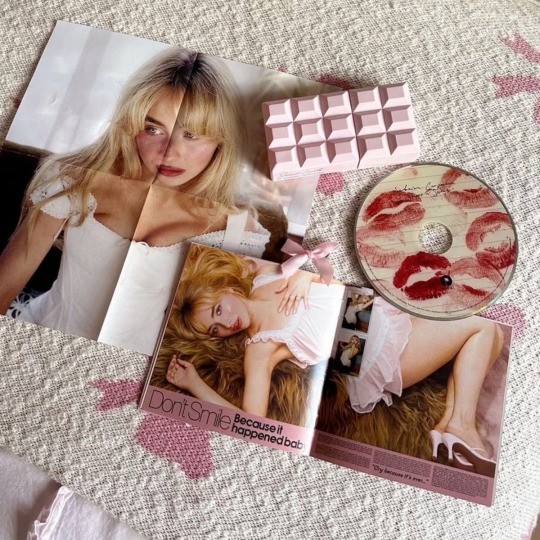
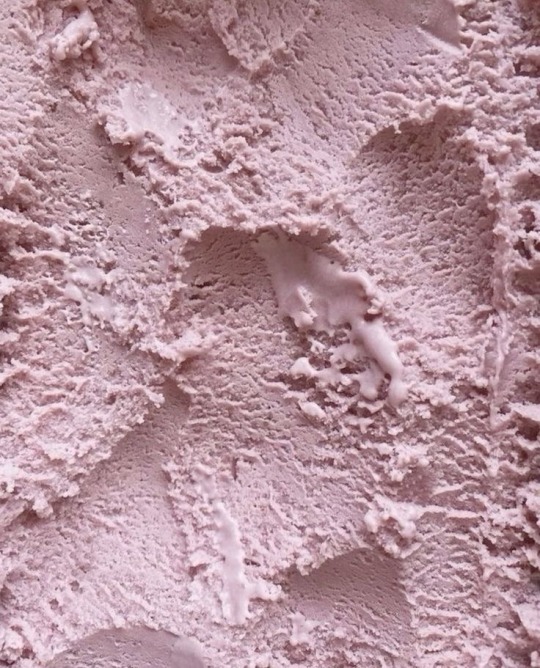
#void state#loa#loa tumblr#loablr#loassumption#pure consciousness#vaunts & affirmations#manifesation#manifesting
528 notes
·
View notes
Text
i just finished madoka magica, and honestly, what drives me so insane about it is how it's just another example of what's been shown throughout the entire show; madoka just loves people. she's not a savior or a hero, she's not a morally pure being, she's a teen girl who loves people too much to let them suffer if she has a chance to stop it all, even if it means reducing her own existence into a rule of the universe.
madoka's love for humanity, despite the horrors she's been forced to witness, despite the evils she knows humans are capable of, she can't let go of that love for other people that she holds. it's her fatal flaw. her achilles heel. her most fundamentally defining quality.
and she's survived by someone who hates humanity, but loves her enough to keep fighting anyways, because it's what she wants. all the love that madoka puts out into the universe is returned right back to her in the form of homura.
#puella magi madoka magica#madoka kaname#mahou shoujo madoka magica#pmmm madoka#pmmm#pmmm homura#homumado#madohomu#homura akemi#pmmm spoilers#madoka magica#madoka magica spoilers#pmmm finale spoilers
590 notes
·
View notes
Text
A Postcolonial analysis of Marius
(Disclaimer: This is not me trying to fight with anyone, this is just my own analysis of Marius. He’s an extremely complex and difficult character and so I have a lot of thoughts about him. I don’t 100% hate or like Marius. But more importantly, I don’t make moral judgements about how OTHER people feel about Marius because at the end of the day these are fictional characters.)
~
I think a big part of what I am going to call the Marius Problem (which I am not gonna take pains to describe here bc iykyk) is that Anne herself didn’t really seem to see a huge problem with him, and that affects his portrayal in the narrative.
There is of course the obvious way he treats Armand, and anyone who is familiar with Anne’s corpus of work knows that that relationship dynamic is something she revisits a lot and often in the context of erotica which is like a whole other bag of worms but…
The thing I feel like we don’t really talk about with Marius enough is his very Western Eurocentric view of the world. From a postcolonial perspective Marius’s philosophy is deeply unsettling. The way he polarizes the “east” and “west” and the modern and medieval, reason and superstition, are very insidious ways of defining things, as is his idolization of the Enlightenment, which was at its heart a positivist, Eurocentric, and deeply prejudiced school of thought which managed to convince the world that social constructions like race and gender were “scientific” in nature.
Marius is basically the embodiment of imperialism, not because he’s some malicious Big Brother twirling his moustache but because he is a very powerful, very privileged, and deeply misguided man who is takes his experience of the world as a universal truth, and who mistakes his own subjective feelings and desires for objective morality.
One of his greatest crimes against Armand that no one talks about is that he tries to force him to conform to a culture that goes against Armand’s own nature and history, and discounts Armand’s view of the world as fundamentally flawed and wrong just because it doesn’t align with his. In the book the conflict of ideologies is between classical humanism (Marius) and Eastern Orthodoxy and mysticism (Armand). In QotD, Marius even laments his failure to “perfect” Armand. Even as he showers them with gifts and affection, Marius treats Armand, Pandora, and even Akasha like dolls. Due to the changes made to Armand’s character in the show, I imagine the dissonance will be even more intense and the suppression of Armand’s selfhood will feel even more disturbing, because it will register on the level of race as well as other forms of identity.
But regardless, the most difficult part of this is that Marius is not doing this out of malice. Marius genuinely thinks he’s doing the right thing. He thinks he’s helping Armand. He thinks he is liberating the subaltern subject from the dark shadows of superstition and oppression. He thinks he is educating a being who must not know his own self and his own rights because he is fundamentally ignorant. He does not realize that what he is trying to do is efface the Other and absorb it into himself. And he eventually abandons Armand, in part, I think, because of his failure to succeed at this mission, and so facing Armand means facing the Other in himself which he wishes to repress to be the ideal enlightened western man. Marius is not even aware of his own need to dominate.
(But please please remember that Marius’s need to dominate is not likewise reflected by a need to be subjugated in Armand. Armand is equally able to move in spheres of dominance as well as submission because Armand does understand much of what Marius does not about the nature of power. Marius does not have this kind of mobility.)
This is at the heart of imperial discourse. This is what gives it momentum, what immortalizes it— the idea that we (the West) occupy some moral high ground from which we can liberate and speak for the subaltern subjects which we ourselves have locked into oppression and victimhood.
And sadly, I don’t think Anne wrote all this into the books consciously. She herself said in an interview that her own philosophy of the world aligns more with Marius’s than with Armand’s, and I think that is part of why Marius is a fundamentally sympathetic character. She made him that way. And I don’t necessarily blame her for it because these kinds of discourses are epistemological and extremely tricky to parse out. Power is that which we cannot name. So yeah, I don’t think Anne was intentional or malicious in it either.
And I don’t think all of us who look at Marius and probably feel somewhere deep down to be like him, to have his power, are doing it because of a fundamental flaw in their humanity or their politics. It’s a flaw in the epistemological system, and I don’t think it’s a flaw anyone can really see unless they’re the Armands in that equation, or they’ve been extensively trained to see it.
And before anyone gets defensive, this is not an attack on anyone or a criticism of any individual. It is a criticism of a system of knowledge and knowing which we likely cannot escape. And it is also a call for people to look at this story differently than they might have before. A call for lovers of Marius to try to begin to understand things from Armand’s perspective, and a call for lovers of Armand to remember that he is far more than just a victim, and that it would be very dangerous and reductive and harmful to his existence as an autonomous subject to understand him in that way. And if you feel the same as I do about these things, please talk about it, don’t get stuck in the surface level dynamics of the Armand/Marius relationship.
And if you’ve stayed with me for this long, I applaud your patience and thank you for your commitment.
#the vampire chronicles#interview with the vampire#armand#tvc#interview with the vampire amc#iwtv#iwtv spoilers#interview with the vampire spoilers#armand iwtv#Anne rice#marius#marius de romanus#the vampire armand#iwtv discourse#book spoilers
161 notes
·
View notes
Text
One of my biggest criticisms of the Mouthwashing fanbase (not the game itself) is the way it treats victims of abuse and disabled characters. There’s a tendency to lean so far into being delicate that, in an effort to be respectful, you ultimately wind up being guilty of the disrespect, yourself.
What primarily set off this rant was something I saw on Twitter (the cesspool of all cesspools, so this is ultimately unsurprising) the other day:
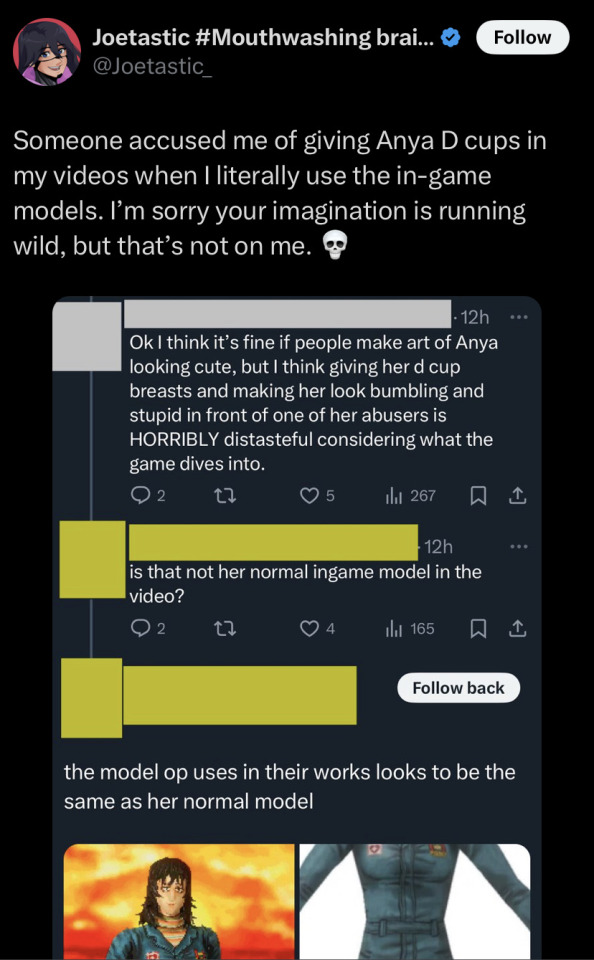
(For absolute clarification, I completely agree with user Joetastic_ here !!)
This. This is just,, I have no words. I felt kinda sick when I saw this !!!!!
There is a DISTINCT and EXPLICITLY OBVIOUS difference between intentional and unintentional portrayals of sexuality. Criticizing an artist for using her CANON proportions reveals more about your own flawed thinking than the artist’s. Here was my response:
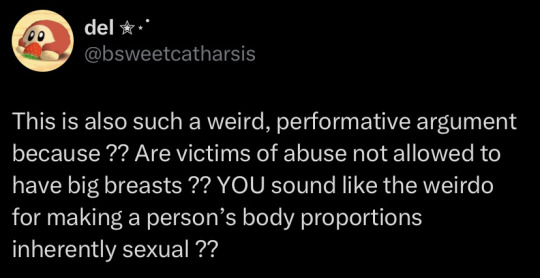
Victims of abuse are people outside of their trauma. They can have sex, have relationships, have fun- Anya talks about how a person’s worst moments don’t define them, which works both ways. A person’s worst experiences don’t become intrinsic to their identity, just as a person’s worst decisions don’t become intrinsic to their character. Anya is not her abuse- she’s a complex person outside of her victimization. I think it’s incredibly important to remember that when discussing her. I think it’s great that artists find a way to show her having fun, being cutesy and silly, being a person, whilst not erasing what happened to her. All of that can be true at once. All of that can occur simultaneously.
The same goes for Curly. While Curly’s body was damaged in the crash, his mind wasn’t changed. Despite his acquired disabilities, he’s still the same person he always was. He deserves to be treated as such. Using his disability to infantilize him or treat him as a pet is, of course, it’s own issue- but to be too careful when depicting him because he is disabled crosses into the territory of dehumanizing him.
It’s okay to portray Anya and Curly as unserious- they’re humans too, not embodiments of their suffering.
311 notes
·
View notes
Text
Krittika the Wild Woman
Aries: 26°40' to 30°00' - Taurus: 0°00' to 10°00'

Krittika refuses to be tamed but enjoys the game of the hunt.
When I first delved into Krittika Nakshatra, much of the information I found seemed overly negative. While it’s important to approach new insights with discernment, it’s equally crucial to peel back the layers and explore deeper truths. Many sources label Krittika natives as "homewreckers" or "husband stealers," citing their association with the knife, a symbol of separation. Scandals and infidelity are often linked to this nakshatra. However, scandals and mistakes are universal—no one is immune to human flaws. So, let’s set the record straight: Krittika's reputation doesn’t define its full potential or how it manifests.

Krittika’s mythology ties back to Kartikeya, the warrior god, who was raised by six Krittikas. This association gives rise to their perceived "affair-like" energy, but it also highlights their untamable and magnetic qualities. Women of Krittika Nakshatra are often highly sought after, critical thinkers, and fiercely independent. Blessed by the Sun, they radiate beauty, vitality, and magnetism, often maintaining a youthful appearance well into maturity. These women don’t rush into relationships; they are selective, choosing partners they hold in high regard, often marrying later in life or not at all. Their independence makes them unwilling to submit to anyone who doesn’t align with their high standards.
The fiery nature of Krittika, symbolized by the element of fire, underscores their untamable spirit. Fire cannot be controlled—it transforms, destroys, and purifies with purpose. Krittika natives act with intention, refusing to compromise their inner drive. Their focus and self-assuredness inspire those around them, especially women, whom they often nurture and uplift. When they speak, their words command attention, reflecting their natural leadership and authority.

Krittika’s dark feminine energy is rooted in its destructive and transformative qualities. As the first solar nakshatra, it carries a fascination with shadow work and the psyche, embodying the alchemical process of transformation—moving from darkness to light. This process involves spiritual death and rebirth, aligning with themes of liberation and being unapologetically themselves. Their journey mirrors the Lilithian archetype, using destruction as a means of creating space for new beginnings. This aura of untamed liberation often intimidates others, while simultaneously drawing them in.

Known as seductresses and huntresses, Krittika natives love the pursuit and the "game of the hunt," but remain untamable themselves. Dominant in relationships, they can struggle to find partners who match their energy or submit to their commanding presence. Saturn-dominated personalities often complement their solar dominance, creating a dynamic where the Sun woman leads. Their regal and radiant quality, a gift of the Sun, makes them naturally alluring.
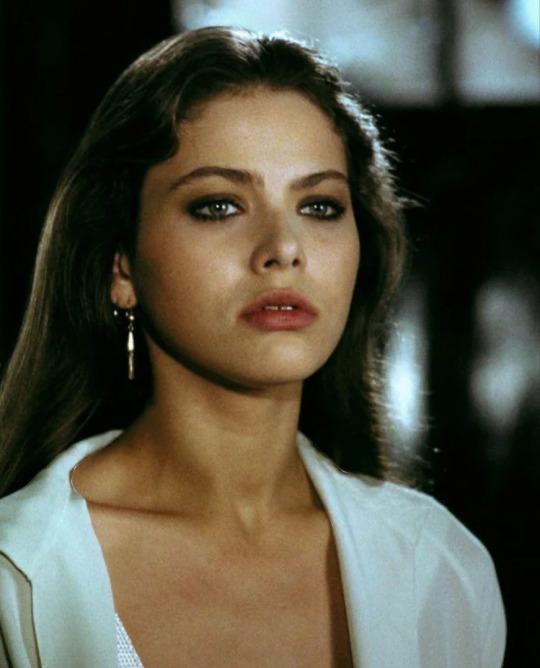
Ultimately, Krittika natives are embodiments of transformative power. They pursue goals with precision, inspire others through their unapologetic authenticity, and embrace their untamable, radiant essence.

*So just because people note that Krittika is known for taking other’s partners, they are also known to be cheated on themselves. Let’s look at the entire scale. An being cheated on is not something anyone can control. However, just because you see a negative note of your nakshatra does not mean it will manifest that way for you. Krittika is a powerful nakshatra and everything should be taken with a grain of salt.*
*Also this is NOT the only nak with this reputation, Pushya is right next door with this rep!*
(All woman used have Krittika placements)

297 notes
·
View notes
Text
Tips for writing a villain
1. Give them a twisted backstory
• A compelling villain has a past that explains why they became who they are. Make their history dark and personal, shaped by betrayal, loss, or abuse.
• What works? Their backstory should not justify their villainy but rather explain how it festered into a desire for control or revenge.
• Example: A villain who was once a loyal soldier but was betrayed by their closest ally, sparking a thirst for power and retribution.
2. Give them a ruthless goal
• Villains and antiheroes are driven by desires that justify any action, no matter how destructive. Their goal should be selfish, twisted, and all-consuming.
• What works? Let their desire for power, revenge, or domination overshadow everything. They believe they are justified, even when causing harm.
• Example: A villain who seeks to overthrow a kingdom, not out of idealism, but simply to make everyone bow before them in submission.
3. Make them calculating
• Villains are often detached, seeing people as pawns in their grand schemes. They plan meticulously, moving with purpose and efficiency.
• What works? Their actions should be deliberate and strategic, not driven by impulse. Show their intelligence, but also their complete lack of empathy.
• Example: A villain who uses people as tools, manipulating alliances and backstabbing to climb higher, all while remaining eerily calm.
4. Embrace their darker nature
• Villains are not plagued by guilt—they embrace their dark nature. Let them find power in their cruelty, and let it drive them forward.
• What works? Show them as unapologetic and even proud of their actions. They have no qualms about being feared and are often defined by their cruelty.
• Example: A villain who enjoys tormenting their enemies, finding satisfaction in their pain and suffering as a means to assert dominance.
5. Make their flaws have consequences
• Villains don’t have redeeming qualities. Their flaws—greed, pride, wrath—define their path and ensure they fall further into darkness.
• What works? Let their flaws be the driving force of their villainy, and don’t shy away from making them destructive.
• Example: A villain whose pride is so consuming that they refuse to ever admit fault, causing their empire to crumble because of their refusal to accept failure.
6. Show their manipulation
• Villains thrive on control, often using manipulation to bend others to their will. They know how to push buttons, exploit weaknesses, and get what they want without lifting a finger.
• What works? Let your villain be the master of deceit, convincing others to do their bidding without them ever truly getting their hands dirty.
• Example: A villain who manipulates a group of rebels, using their emotions to stir discord, only to turn them against each other in the end.
7. Make them evil
• A villain’s cruelty knows no bounds. They do what needs to be done, and that often means eliminating anyone who stands in their way—without hesitation or remorse.
• What works? They should be willing to destroy people, relationships, or even entire societies for their goal. Show no mercy.
• Example: A villain who doesn’t hesitate to wipe out entire villages to send a message, and enjoys the fear that it instills in others.
8. Let their obsession to consume them
• Villains are often driven by obsession. This obsessive need for power, revenge, or control blinds them to everything else—relationships, morality, or even their own humanity.
• What works? Let their obsession escalate over time, showing how it spirals out of control until it consumes them entirely.
• Example: A villain who is obsessed with immortality, willing to sacrifice everyone they care about, including themselves, to achieve it.
9. Allow for betrayal and treachery
• Villains thrive on betrayal. They have no loyalty but to themselves, and they often betray others before they are betrayed.
• What works? Let your villain double-cross anyone in their path—friends, allies, and even family. Their only loyalty is to their goal.
• Example: A villain who promises to spare their rival, only to turn on them when the rival is most vulnerable, solidifying their role as a traitor.
10. Let them unravel
• As villains grow in power and dominance, the pressure to maintain their control will cause them to crack. Their downfall can come from their inability to manage the very chaos they’ve created.
• What works? Show their confidence slipping, as the consequences of their choices catch up to them. This can bring about their ultimate defeat or destruction.
• Example: A villain who, after accumulating power, loses control over their empire, eventually crumbling under the weight of their own tyranny.
11. Allow for redemption (or not)
• The possibility of redemption adds complexity. However, it’s important that it feels earned. Alternatively, allow your villain to continue spiraling if redemption is out of reach.
• What works? Either let them evolve toward redemption—or show that their flaws are too deeply ingrained for them to ever return from darkness.
• Example: A villain who, after everything, is offered a chance to change but chooses power over love, reinforcing their villainous arc.
Follow for more!
#creative writing#writeblr#writer stuff#writers on tumblr#writerscommunity#writing#novel writing#writing tips#tips#writers and poets#writing villains
320 notes
·
View notes
Text

Are You Satisfied?
As you might have heard chapter 236 of Jujutsu Kaisen ends with the death of Gojo Satoru. The fandom is making a pretty big deal about it. As someone who predicted from the beginning that Gojo was going to lose against Sukuna, the reaction is fascinating to me. This is perhaps the most controversial chapter of Jujutsu Kaisen I've ever seen. So I've decided to throw my hat into the ring.
The central theme of Jujutsu Kaisen is death, so the death of one of the main characters isn't too surprising, but what does Gojo's death mean for the story? What does it say about his character?
As I said above I am a little bit shocked by the extreme controversy over Gojo's death. Gojo was never going to win the fight in the first place, because Jujutsu Kaisen is a story and the story would be over if he defeated Sukuna. He'd easily be able to take care of Kenjaku afterwards and the main conflcit would be resolved. Would it really be an interesting story if Gojo one shotted the villains while the kids just wathced on Television?
The story is also not about Gojo, it's about the students. Gojo may think he's the protagonist of reality but he's not the protagonist of the story.
Once again, Jujutsu Kaisen is a story and stories have themes. We may grow personally attached to characters, but characters are just narrative tools to convey the themes of a story, no different from prose, dialogue, and art. Characters are a tool to be used well or used poorly, and sometimes yes that means killing them. Whether Gojo's death was naratively satisfying though isn't the purpose of this post though we're only asking what does it mean?
Finally, Jujutsu Kaisen is not only a fictional story, it's specifically a tragedy. Full disclosure, it's a manga about death.
The Protagonist of a Tragedy
So, number one shout out to me for making this post 4 months ago where I called the way Gojo would end the fight.


Excuse me while I fist pump for calling it!
The question on everyone's minds is why does one of the most powerful characters in the manga die offscreen in a pretty humiliating way, cut in half and helpless on the ground just like Kaneki. The reason Gojo didn't get a more heroic (or cooler) death is because we're not reading My Hero Academia, this is not a story about heroes or even a typical Shonen manga it is a tragedy.
In poetics Aristotle defines tragedy as:
"an imitation of an action that is serious, complete, and of a certain magnitude; in language embellished with each kind of artistic ornament, the several kinds being found in separate parts of the play; in the form of action, not of narrative; through pity and fear effecting the proper purgation of these emotions" (51).
To paraphrase a tragedy is about human action, actions characters make in a tragedy often have dire consequences. One of the most common consequences if the reversal of a hero's fortune, a hero of a tragedy usually starts out on top and ends up on the bottom because of the bad choices they make. If in normal shonen manga characters overcome their flaws through effort and persistence, in Jujutsu Kaisen we see characters more often than not lose to their flaws.
The reason I posted that Kaneki panel specifically is because it was a brilliant moment of narrative punishment for Kaneki's central character flaw. Kaneki the hero's main flaw is that he always fights alone, and he constantly makes that same choice over and over again to fight alone. One of the characters helpfully explains it as well.

Stories are primarily about change. If a character doesn't change they're not serving the plot, unless that specifically is the point. People have pointed out how abrupt it is for Gojo to get sealed in Shibuya, get let out, and then immediately die afterwards but that's kind of the point. Gojo made more or less the exact same choice (he asked for Utahime's help for a buff but otherwise fought the entire battle himself). The definition of insanity and what not, why would doing the same thing over and over again net him a different result?

Not only did Gojo choose to fight alone, but as I've been hammering on and on about in previous meta the entire fight Gojo cared more about fighting a strong opponent then he did saving Megumi, the child he was responsible for.
Jujutsu Kaisen is not a typical shonen manga where everything is resolved by beating a strong villain in a fight. That's specifically why I used the Tokyo Ghoul reference, because the reason Kaneki is defeated offscreen like that is because he thought the world worked like a shonen manga. He has a fantasy sequence where he's fighting Juzo in a shonen battle tournament like this is Yu Yu Hakusho right before it snaps back to reality and he's limbless on the ground.
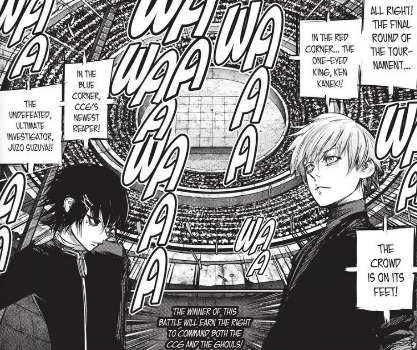
Gojo is a major character in the manga Jujutsu Kaisen, literally "Sorcery Fight" and he is the best sorcerer in the whole world. His entire identity revolves around being a sorcerer. Since he is so good and beloved at what he does, he thinks that everything is resolved by exorcising a curse or defeating a strong opponent. He has basically no identity outside of that. Which is why when he's fighting the possessed body of his student, a person he's been mentoring since childhood his priority is not to save Megumi but to beat a strong opponent. Gojo is a sorcerer, before a human being. That's who he is, that's who he always has been since day one.
I think part of the negative fan reaction comes from fans being really attached to this scene in the manga and deciding Gojo's entire character revolves around being a good mentor figure to children.

Which is just incorrect, Gojo's entire character revolves around being the strongest. On top of that though, Gojo can care about children and also care about being the strongest he can care about multiple things at once and have those things contradict each other because humans are complicated. I'd point out even in this panel where he's stating motivation he's not trying to raise these kids up into being healthy adults, he wants them to be strong Jujutsu Sorcerers. Even when he's raising kids, his intention is to turn them into Jujutsu Sorcerers because everything in Gojo's mind revolves around Jujutsu Sorcery. Gojo does not exist outside of the world of sorcerers. Gojo may be the chosen one but he'd never be able to hold down a job at Mcdonalds.
I think in general readers put more investment in the things characters say out loud, rather than their actions. You can say one thing and do another. I can say "I should never eat sweets again I'm going to improve my diet", and then go and eat ice cream five hours later. Gojo can state out loud his intention to foster children and protect their youths, but then fail to properly do that in the story. Characters are not always what they say they are, that's why they're interesting to interpret. This isn't me calling the readers stupid, just pointing out that Gojo is made up of contradictions. He wants to get rid of the old guard and replace them with something new, but Gojo IS THE OLD GUARD.
If the culling games arc has shown us one thing, it's that ancient sorcerers brought to the modern age do not care that much about human life on an individual level, they are all of them egoists. There's a reason Gojo resembles someone like Sukuna more than he does any other character in the manga. I'm not saying Gojo is exactly like Sukuna, he's far more altruistic and uses his genuinely noble ideals but at the same time Sukuna is a shadow archetype to Gojo he represents Gojo's flaws. The flaws that Gojo succumbs to in tragic fashion.
Which if you believe that Gojo genuinely does love his students, and the ideal he's fighting for is to raise up a better generation and allow them to live out their youths, then Gojo throughout the entire Sukuna fight is acting against those ideals. He cares far more about fighting Sukuna then he does saving Megumi, it's shown over and over again in the battle, Megumi is an afterthought to him. If Gojo care moredefeating the big bad and saving the world is more important than helping a child that Gojo is responsible for then Gojo is acting against his stated principles. Why should Gojo win the fight when he's fighting for all the wrong reasons?
Tragedies are like visual novels, if you make the wrong choice the novel will give you a red flag. If you ignore the red flag then you get locked into the route with the bad ending. Gojo always fights alone. Gojo only ever fights for himself, even if he's using that selfishness in support of a more noble ideal like creating a better generation of sorcerers. If Gojo consecutively makes the same changes then in a tragedy he's not going to be rewarded for it.
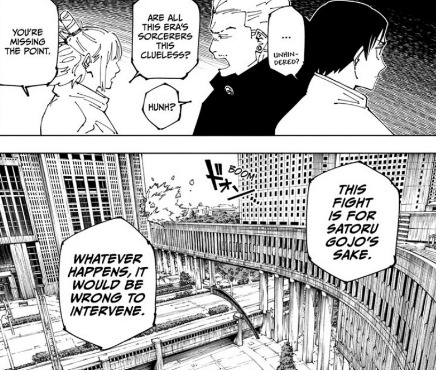
Gojo wants the old generation out and the new generation in, but Gojo resembles the old generation too much. Old sorcerers like Hajime and Sukuna respect him, Hajime argues that Gojo being able to fight for his pride is far more important than him living to the end of the battle when Yuta wanted to interfere and help him.
Gojo's death isn't a surprise curve ball that Gege is throwing us for shock value, it's a result of his choices throughout the manga. A manga about change, and the change between generations is not going to punish a character for remaining roughly the same. Of course you might find it disappointing that Gege didn't give Gojo the chance to grow and change and experience a character arc like Megumi or Yuji, but Jujutsu Kaisen is a tragedy, and the way Gojo's arc ended is consistent with what Gege wrote.

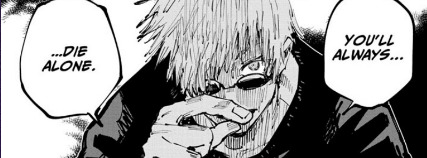
Jujutsu Kaisen is not just a tragedy though, it's a manga about death. The manga begins with Yuji's grandfather warning him not to die alone the way that he did. His grandfather's dying words are what motivate Yuji throughout the beginning of the manga as he's searching for a "proper" death.
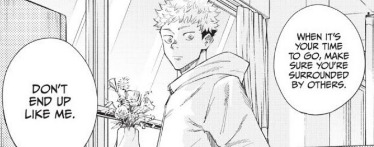
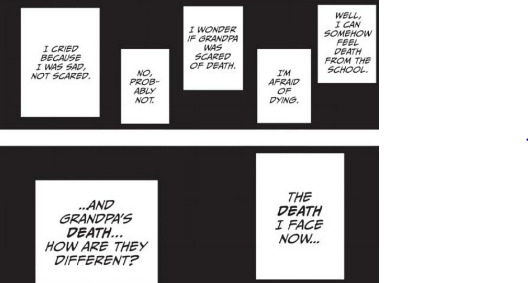

One of the major themes of Yuji's character is a contemplation of death. He accepts that death is inevitable, so he wants to save them from the gruesome deaths they'd experience if they became victims to curses and allow them to have a more satisfying death. Yuji's grandpa died an unsatisfying death because he died alone in a hospital room. Yuji even tries to make his own death a satisfying one because he believes by dying to seal away Sukuna he'll reduce the total number of casualties to curses.
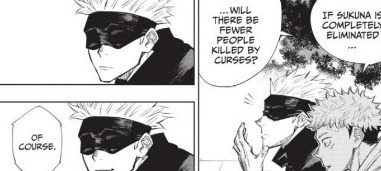
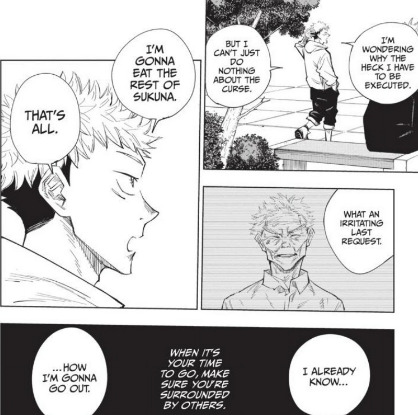
Jujutsu Kaisen keeps investigating the theme of death and what exactly would make for a satisfying death. At one point it's all but stated that death is the mirror that makes humans analyze their lives.
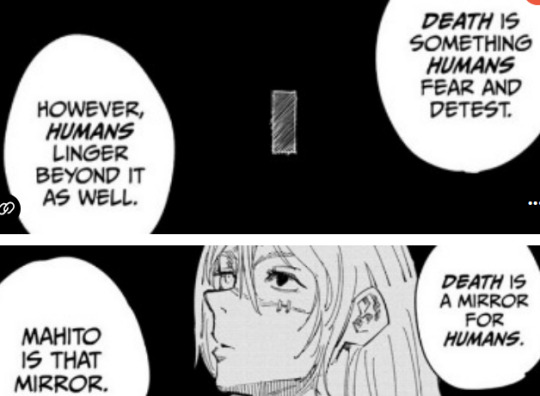
When Yuji fails to save Junpei from the "unnatural death" it calls into question whether or not his goal of saving people from unsatisfying deaths and the gruesome deaths caused by curses is even feasible. Nanami even says that Yuji might not be able to accomplish his goal and warns him away from the path.
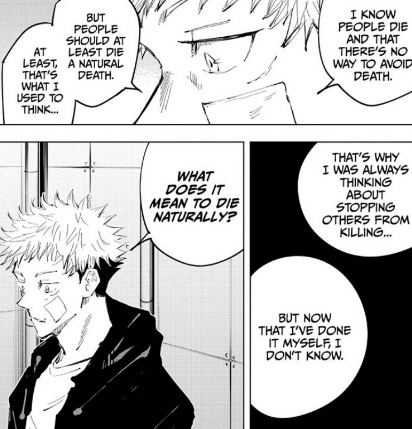
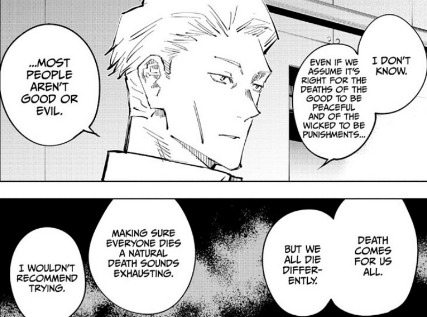
We see repeated unsatifying deaths in the manga, each time someone reflecting on their deaths that they weren't able to get what they wanted out of life. This list comes via @kaibutsushidousha by the way I'm quoting them.
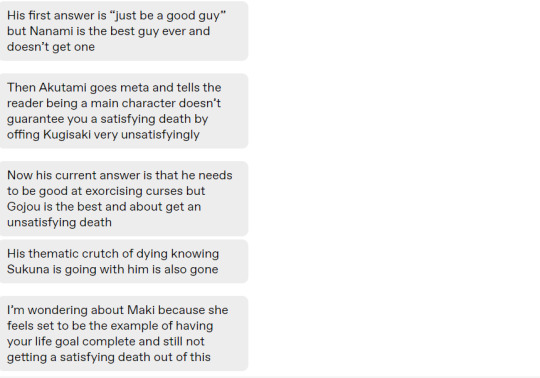
Nanami's a character who chose to work as a sorcerer because he didn't want to evade the responsibility of doing all you can to help people, he wanted to believe he's somewhere where he's needed. He never runs away from responsibility like Mei Mei does so he quite literally works himself to death, living and dying as a sorcerer. Nanami or Gojo's dying hallucination of Nanami even says as much, his death is the result of him choosing to go south and returning to be a sorcerer.
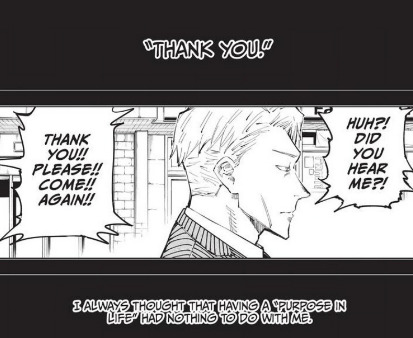
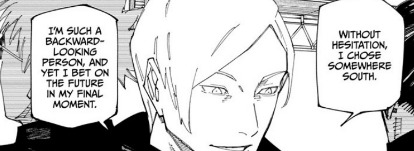
Maki chose revenge against the Zen'in over her sister, and as a result Mai is dead. Maki has all the power in the world now, her revenge complete but she's left with a sense of "now what?" She's as strong as Toji now but she failed to protect her sister, and it's the result of the choices she made. Maki's reflection isn't triumph, it's "I should have chosen to die with her."

Even Yuji himself is robbed of his narrative purpose. The manga began with Yuji saying he wants to choose how he's going to die and he'll die taking out Sukuna with him so he can reduce the number of people killed by curses in the world. Both of those things are thrown in Sukuna's face. Number one the amount of people Yuji can save by permanently killing Sukuna is now a moot point because he let Sukuna rampage in Shibuya.
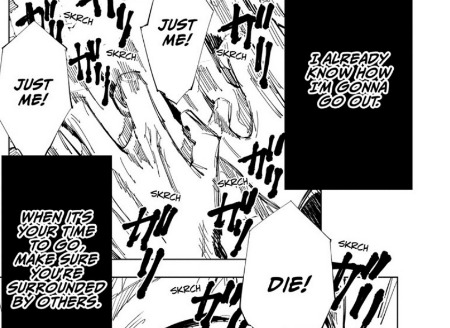
Number two, Sukuna isn't even in Yuji anymore. To build on what Comun said though, this repeated tragedy has a purpose to it and understanding requires understanding that Jujutsu Kaisen is an existentialist manga. Existentialism is basically a school of philosophy centered around the question of "Why do I exist?"
There's nothing about the invetability of death to make you question why you're alive in the first place. In the myth of Sispyhus, Albert Camus boils down all of philosophy to one question.
"There is but one truly serious philosophical problem, and that is suicide. Judging whether life is or is not worth living amounts to answering the fundamental question of philosophy. "
All of philosophy is should I shoot myself in the head or should I keep living? Everything comes after that question, which is why in Jujutsu Kaisen a lot of the characters motivations revolve around them contemplating death. Sorcerers exist in a world where they can die any moment, and as Gojo says most of them die alone. It might be the nature of sorcery itself that causes so many people to die, not only are they dying because they are trapped in an uncaring system, but the characters themselves aren't really attempting to live outside of it. They live and die as sorcerers, replaceable cogs in the machine.
All of these unsatisfying deaths may just be the result of all these characters making one choice, to live as sorcerers rather than people. Because to exist means to live in the world.
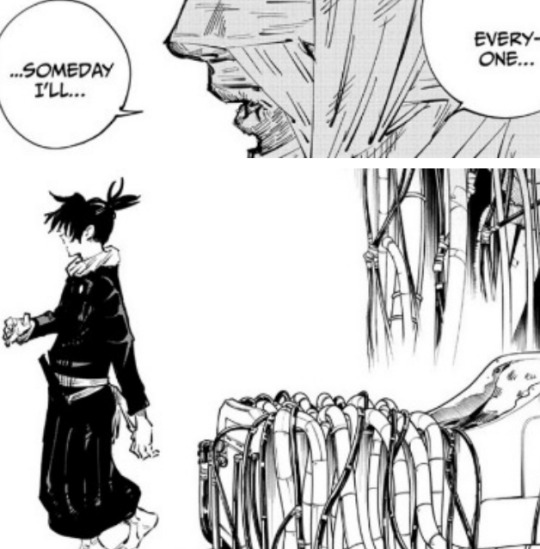

Even in Mechamaru's case, his goal is deeply existentialist by what I defined, all he wants to do is live in the world with everyone else rather than be stuck in his hospital room but his actions contradict that goal. Instead of letting his friends come and visit he's obsessed with the idea of getting a normal body because he feels that's the only way he can exist with everyone else, he makes a deal with the devil, he lies and goes behind their backs. He wasn't living with everyone else in the world and he could have chosen to, he chose wrong and his death is the result of that choice.

Jujutsu Sorcerers aren't living in the world. They're living in a little snowglobe far removed from the world with its own rules, most of them regressive and disconnected from the rest of society. If you define existentialism as just "living in the world' then a lot of these characters aren't, because they only exist in the world of sorcery.
INVISIBLE BUFFY: What are you talking ab- SPIKE: The only reason you're here, is that you're not here. (drinking) INVISIBLE BUFFY: Right. Of course, as usual there's something wrong with Buffy. She came back all wrong. (moving around on the bed) You know, I didn't ask for this to happen to me. SPIKE: Not too put off by it though, are you? (drinking) INVISIBLE BUFFY: No! Maybe because for the first time since ... I'm free. She tosses the sheet aside. Spike looks around, trying to figure out where she's going. INVISIBLE BUFFY: Free of rules and reports ... free of this life. SPIKE: Free of life? Got another name for that. Dead.
Not living in the world with everyone else is the same as being dead.
A lot of these characters either make the choice to act alone, or be a jujutsu sorcerer rather than a person and because of that they die as sorcerers, b/c sorcerers die that's what they do. Mai didn't want to keep living as a hindrance to Maki so she kills herself. Maki didn't want to be anything other than a sorcerer, so her little sister dies and she's not a big sister anymore. Nanami chose to leave his job behind and become a sorcerer again, he dies as one.
Of course I don't think the manga is punishing characters for being too egotistical, but rather too unbalanced. If anything Mai is too selfless and that is why she died, she didn't want to live for herself and chooses self sacrifice for her sister. An unbalance between selfishness or selflessness results in an underdeveloped ego. Jujutsu Kaisen doesn't punish individualism per se, moreso if you're not a fully developed individual you won't last long. Because it's also a manga about growing up in the world, and a person who doesn't have a healthy, mature, well-balanced sense of self is not a grown up.
This twitter user det_critics points out that Gojo (and also Yuki + Yuji's) failures in the manga can be attributed to the fact they don't have real senses of self.
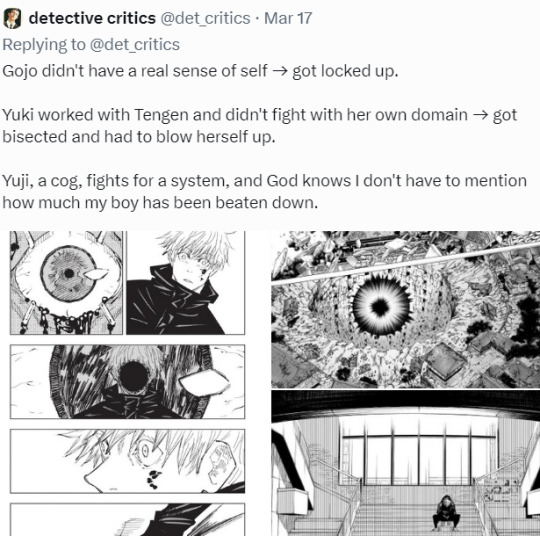
Gojo has an identity crisis as outlined by Geto, "are you Satoru Gojo because you're the strongest, or are you the strongest because you're Satoru Gojo?"
It's a challenge for him to find some reason to live outside of being the strongest, and in tragic fashion Gojo just doesn't find it in time. Gojo lived for fighting others, and proving to himself that he's the strongest, and that's how he dies.
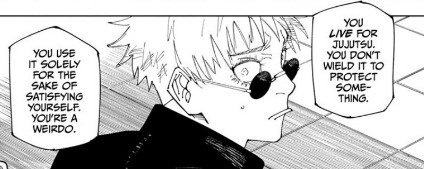
There's something I like to say about narrative punishment in stories. There are two ways to punish a character, you either don't give them what they want, or you give them exactly what they want. This is the latter, Gojo wanted to find someone stronger than him because deep down he believed that nobody could understand him unless they were on his level. He wanted to be surpassed, and that's why he focused on creating stronger young sorcerers, but he never shook himself of the belief that only someone as strong or even stronger than he was could ever be emotionally attached to him so he made a deliberate choice to draw a line between himself and others.
Gojo's essentially gotten what he wanted from that choice in the worst way possible. The student he picked to succeed him Megumi, has his body stolen and kills him. Gojo is surpassed, but it's not by one of his own students it's by an enemy that's not only trying to kill Gojo but is going to massacre his students afterwards.
Gojo's spent his entire life believing that because he's more powerful that makes him inherently different and above others, and being lonely because he himself believed he couldn't relate to ordinary people and he dies like an ordinary person, an unsatisfying death where he wasn't able to bring out Sukuna's best, where he gets unceremoniously cut in half offscreen but yay he's no longer the strongest. He's gotten exactly what he wanted. Megumi is still not saved, Sukuna's probably going to kill more people because Gojo failed to stop him here, but hey at least he stopped to compliment Gojo.
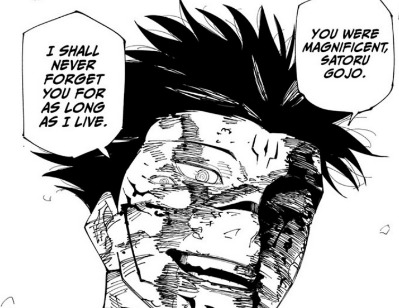
It's empty, but it's empty because of the choices Gojo made in life to just not bother connecting to people or develop any kind of identity besides being a sorcerer. Gojo lives and dies as a sorcerer, and his dying dream is returning to a teenager being surrounded by everyone he was with during his school days, because that's the happiest time in his life. Ironically he was happier before he became the strongest, because that was the only time in his life that he allowed himself to connect to people.
However in the eyes of others, he is someone who has it all. That's why he is always alone. There was no one who could hold the same sentiments and mutually understand him. Geto was the only one who could understand what he was trying to say, and the only one who could communicate well with him.
It's no coincidence Gojo and Geto die exactly a year apart on the same day, if anything I'd say the reasons they die are similiar to at least thematically. They both die because they don't want to live in the world. Geto thinks the world is too corrupt and GOjo doesn't want to be anything other than a sorcerer, both of them fail to adapt.
「 'It's just. . .' It's just that it was what Geto had to do. [...] To someone like him, the reality that the world of sorcerers presented to him was just too cruel. '. . .that in a world like this, I couldn't truly be happy from the bottom of my heart.'」
They can't be happy in a world like this from the bottom of their hearts, so narratively they both die. The things they chose to live for at the end of their life they fail to accomplish, Gojo is no longer the stronget, Geto fails to wipe out mankind or make major changes to the world and they die as normal people unsatisfied because they weren't trying to live in the world and make connections to others. They die almost karmically a year apart because their main connection for both of them, the thing which made them feel connected to the world and other people was each other.
Which is why this panel breaks my heart and is so narratively satisfying because of how unsatisfying it is...
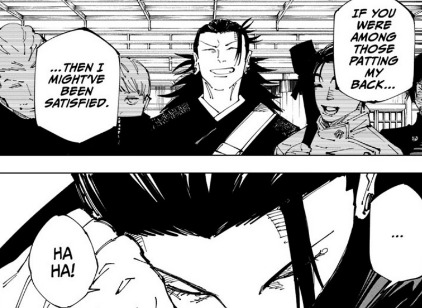
"If you were among those patting my back... then I might've been satisfied."
Gojo reflects that he's not satisfied dying against Sukuna, not because he failed to give him a good enough challenge but because Geto wasn't there to pat him on the back. The one thing that would have satisfied him he couldn't have, because he didn't live to connect to people he lived to be the strongest and he died alone as the strongest. There's just something deeply upsetting about Gojo's dying dream fantasy just him being there talking with all of his dead friends who he never appreciated or connected to properly when he was alive. Knowing that if something had just gone a little differently, that even if he had to die no matter what he could have died happier if Geto was among the people saying goodbye to him because that connection with Geto is what gave his life meaning.
Dazai Osamu: "A life with someone you can say good-bye to is a good life, especially when it hurts so much to say it to them. Am I wrong?" -Bungou Stray Dogs Beast
#gojo satoru#jjk spoilers#jjk meta#jujutsu kaisen 236 spoilers#jjk 236#jujutsu kaisen 236#jjk 236 spoilers#jujutsu kaisen#jujustu kaisen meta#jujutsu kaisen theory#jujutsu kaisen manga#satoru gojo#geto suguru#suguru geto#satosugu
2K notes
·
View notes
Text
Woeful Tooth. (set in the "Not A Bad Day" universe)
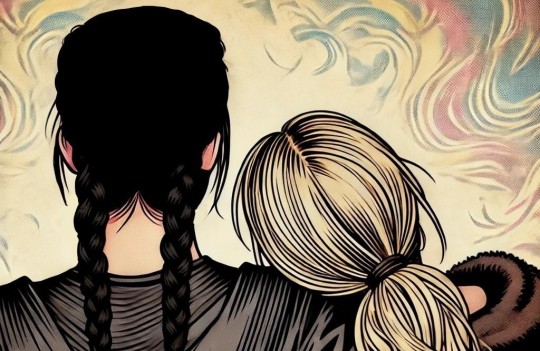
Summary: Wednesday doesn't want to go to the dentist.
Theme: FLUFF!!!
Pairings: Wednesday x Fem Reader. Theme: Fluff! Set in the "after dating" period.
Warnings: Root Canal?!?
Thanks for the insight @cobaltperun
You weren’t one to overthink—well, not much. But the subtle shift in Wednesday’s mood was undeniable. After dating her for months, you had come to learn every expression she wore, no matter how imperceptible it might seem to others.
And right now, something was wrong.
And while Wednesday Addams wasn’t exactly the conversational type, her words now came in curt whispers, that might not alarm anyone else, but it worried you.
In the past few days, her choices leaned exclusively toward soft foods like soups, puddings, and smoothies. And Wednesday eating puddings? That scared you.
“Mashed potatoes, Wednesday?” you asked, raising an eyebrow.
She leveled you with a glare. “They are not mashed potatoes. They are boiled tubers, pulverized into an unrecognizable state… much like most victims in my books. I find their texture fascinating.”
“You hate soft foods,” you countered, leaning forward. “Last week, you said pudding was ‘an insult to the human palate.’”
She didn’t respond, instead taking an excruciatingly slow bite, her jaw moving in a way that looked… wrong. She was chewing… carefully?
“Oh my god. You’re in pain,” you blurted, a mix of concern and frustration bubbling up.
Wednesday’s hand twitched, the only sign that you’d struck a nerve. “Your imagination is as dramatic as Enid’s wardrobe. I’m fine.”
“She’s not fine,” Enid chirped from her side of the table, “She’s been super moody these days.”
You shot her a look. “When isn’t she moody?”
“Good point.”
Wednesday stood abruptly, her chair scraping against the floor. “If this riveting discussion of my character flaws is over, I have more pressing matters to attend to.” Without another word, she strode off, leaving you and Enid.
You didn’t confront her again until later that evening in her dorm, “Alright, spill it.”
Wednesday raised a single eyebrow, still not looking at you. “I’ve spilled nothing.”
“You’re acting weird.”
“Am I?”
“Yes, weirder than usual. You’re always quiet but how did you get quieter than quiet? And don’t get me started on your sudden love affair with soft foods. Care to explain what’s going on?"
"Is this a lovers’ quarrel? Do I need to—" Enid just entered the room,
"Enid, no," you interrupted. "Enid, yes," Enid countered, smirking. You ignored her and turned back to Wednesday. "I’m serious. Tell me what’s wrong. You’ve been eating soft foods, avoiding anything crunchy, and barely talking. That’s not you.”
She didn’t respond.
“Wednesday.” Still nothing.
“Enid, start blasting pop music until she cracks.” You ordered,
"On it mam," Enid smirked going for her laptop.
At that, Wednesday sighed—an actual sigh—and turned to face you. “You are as relentless as the Grim Reaper, though far less charming.”
“That’s the nicest thing you’ve ever said to me.”
Her lips twitched, almost imperceptibly. “If you must know, I’m experiencing a mild inconvenience. It’s nothing worth discussing.”
You tilted your head, studying her. “Define ‘mild.’”
“An intermittent, dull ache.”
“In English?”
She scowled. “A toothache.”
“Wait, you have a tooth problem?” Enid’s grin widened. “This is hilarious.”
“I fail to see the humor,” Wednesday deadpanned.
“I’m calling the dentist,” you announced.
“No, you are not.”
“Oh, yes, I am.”
“You’re being ridiculous.” She crossed her arms, “Pain builds character.”
“Pain builds cavities if you don’t deal with it,” you shot back.
She raised an eyebrow. “Perhaps I enjoy the pain. It’s a constant reminder of mortality, a delightful ache that—”
“Stop. Just stop,” you interrupted, pinching the bridge of your nose. “You’re not romanticizing a toothache right now.”
“You are overreacting,” she said coolly.
“And you’re underreacting!” you replied, unable to hold back any longer.
Enid laughed. “This is way better than the TV shows Yoko watches.”
You pointed a finger at Wednesday. “If you think I’m letting that tooth-problemed mouth anywhere near my things—” “What things?” Enid interrupted. You ignored her, focusing on Wednesday’s icy glare. “—then you’ve got another thing coming.” Wednesday stood abruptly, somehow towering over you despite her "height".
“I refuse to be dragged into some sterile torture chamber.”
“Oh, you’re being dragged, alright.”
You grabbed her hand, your grip firm despite her half-hearted attempts to wriggle free.
“This is a violation of my autonomy,” she hissed as you pulled her toward the door. “You’ll thank me later.” “You’re insufferable,” Wednesday muttered. “I love you too,” you replied Behind you, Enid called out, “WHAT THINGS?”
"This place reeks of mundanity," Wednesday muttered. You sighed, gripping her hand, which she allowed but did not return. "Wednesday, it’s a dentist’s office, not a dungeon." "I would prefer the dungeon," she replied dryly. Before you could respond, you heard the assistant's voice, "Wednesday Addams?" "That’s us," you said, standing and tugging Wednesday up with you.
"Well, I have some good news and some bad news," The dentist began. "Start with the bad," Wednesday said flatly. "Your tooth isn’t just decayed—it’s broken."
You blinked. "Broken? What do you mean broken?"
"It looks like it was fractured with blunt force—something hard enough to crack it deep into the root. That’s likely why you’ve been in so much pain."
You whipped around to face her. "Blunt force? What the hell, Wednesday? What did you do?"
Wednesday’s eyes flicked to you, her expression carefully blank. "Nothing of note."
"Wednesday…"
"I fail to see how this line of questioning is relevant," she replied.
You opened your mouth to press further, but the dentist interjected. "I understand this might be a surprise, but for now, let’s focus on treatment. We’ll start with a root canal to clean out the infection and save the tooth. It’s a multi-step process, so today we’ll address the infection and prep the area. Afterward, we’ll schedule a follow-up to place a crown and finalize the procedure."
You sighed, realizing this wasn’t the time or place to interrogate Wednesday. "Fine. Let’s just get it fixed."
The dentist nodded. "Alright, Wednesday, I’ll numb the area first, and then we’ll get started."
Wednesday didn’t even flinch as the needle approached. Instead, she shot you a pointed glance, as if daring you to comment. "She’s handling this easily," The dentist remarked as she drilled the decay. "Most people squirm a little." "Wednesday doesn’t squirm," you muttered, half in admiration, half in exasperation.
After about half an hour, the dentist stepped back, wiping her hands. "That’s the worst of it done. I’ve placed a temporary filling, but she’ll need to return for the crown placement. I’ll schedule the next appointment before you leave."
"Thanks, Doc," you said, relieved.
"Avoid eating anything hard or chewy until the permanent crown is in place. And no blunt force trauma to your mouth, please."
You shot Wednesday a look. She remained silent.
The bus ride back to Nevermore was quiet, You sat beside Wednesday, leaning your head against her shoulder, exhaustion finally catching up to you. "That wasn’t so bad," you murmured sleepily, your eyes drifting shut.
Wednesday didn’t respond, her gaze fixed straight ahead. But as the minutes ticked by, her eyes softened, shifting down to you. Your breathing was slow and even, your face peaceful against her shoulder.
Beating those boys in Weathervane, who Enid mentioned had made comments about you, was worth it. Even if it had cost her a tooth.
[Author's note: Trying to improve my one-shot writings more, how do you feel about this one? You guys can consider this is set in "Not A Bad Day"s universe, prolly after you two started dating, maybe I can write a one set on how Wednesday asked you out]
MORE ONESHOTS HERE--->WORKLIST
#wednesday addams x reader#wednesday x reader#tara carpenter x reader#jenna ortega x female reader#wednesday addams x female reader#wednesday adams x reader#wednesday addams fanfic#wednesday addams x you#wednesday#jenna ortega x reader#wednesdayaddams#wednesday netflix#wednesday addams#wednesday x female reader#wednesday x fem reader#wednesday x you#wednesday addams x fem!reader#netflix wednesday#jenna ortega#jenna ortega x you#wednesday x fem!reader#jenna ortega x fem!reader#vada cavell x reader#jenna ortega imagine#tara carpenter x you#jenna marie ortega#jenna ortega x y/n#fluff
220 notes
·
View notes